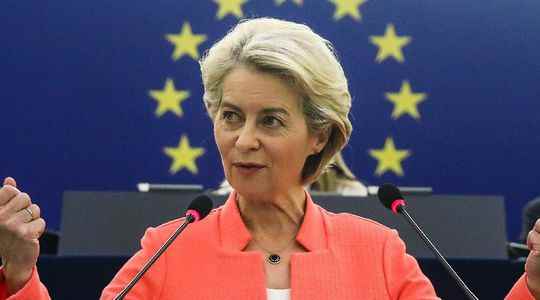Whereas his text messages exchanged with the CEO of the Pfizer laboratory, Albert Bourla, have raised questions in recent days and fed a shower of conspiracy theories, the President of the European Commission, Ursula von der Leyen, had to welcome the economic results of the euro zone with eagerness and relief. According to a first estimate published on Monday by Eurostat, the body responsible for statistics at European level, the gross domestic product (GDP) of the euro zone recorded growth of 5.2% last year. A historic figure which confirms the recovery of the European economy after its collapse linked to the Covid-19 pandemic. In 2020, GDP fell by 6.4% in the 19 countries sharing the single currency and by 5.9% within the European Union, according to the European statistics office.
These results are enough to make Ursula Von Leyen smile since they turn out to be above the estimates established in November by the Commission. A growth of 5% had been imagined in view of the results during the first three quarters of the year (an increase of 2.2% and 2.3% during the last six months). The European Union was counting on its recovery plan, adopted in July 2020, whose envelope of 1,824.3 billion euros aimed to finance the rebound of the economies of the Member States.
A proactive United States, a powerful China
If the slight improvement compared to the forecasts is gratifying for the European heads of state, it does not erase the advance taken by the Chinese and American rivals. China ends 2021 with growth of 8.1%, after an increase of 2.3% in 2020. GDP rose to 5.7% last year in the United States after a decline of 3.5 points in 2020.
To revive American growth, Presidents Donald Trump and Joe Biden have set about driving a proactive fiscal policy. Numerous economic support plans accompanied the recovery: the Cares Act (2,200 billion); the American Rescue Plan (1,900 billion) or the Covid Relief Package (900 billion). The US government has also made efforts to organize national vaccination campaigns from the spring of 2020. But this economic recovery is accompanied by record inflation. Consumer prices rose 7% according to the Labor Department, the biggest increase since June 1982.
China, for its part, recorded growth of 8.1% in 2021, exceeding the 6% forecast. Despite the crisis in the real estate sector, the difficulties of small businesses and the resurgence of the epidemic of coronavirus, the Asian powerhouse is experiencing staggering levels of progress. If the Chinese economy started the year at a frenetic pace (+18.3% growth in the first quarter), it ended it at a level not reached for a year and a half (only 4% growth in the last trimester). The services sector has not returned to pre-pandemic growth and the People’s Bank of China (PBC) has been forced to cut interest rates to cushion the slowdown in its economy. The country led by Xi Jinping nevertheless remains the second largest economy in the world.
